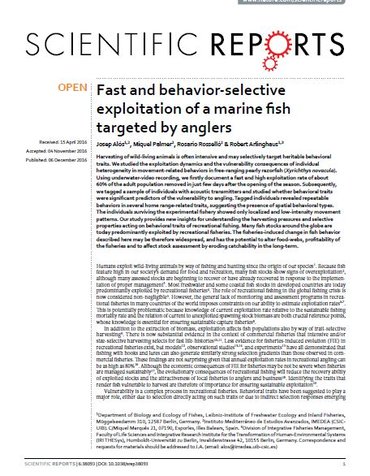Harvesting of wild-living animals is often intensive and may selectively target heritable behavioral traits. We studied the exploitation dynamics and the vulnerability consequences of individual heterogeneity in movement-related behaviors in free-ranging pearly razorfish (Xyrichthys novacula).Using underwater-video recording, we firstly document a fast and high exploitation rate of about 60% of the adult population removed in just few days after the opening of the season. Subsequently,we tagged a sample of individuals with acoustic transmitters and studied whether behavioral traits were significant predictors of the vulnerability to angling. Tagged individuals revealed repeatable behaviors in several home range-related traits, suggesting the presence of spatial behavioral types.The individuals surviving the experimental fishery showed only localized and low-intensity movement patterns. Our study provides new insights for understanding the harvesting pressures and selective properties acting on behavioral traits of recreational fishing. Many fish stocks around the globe are today predominantly exploited by recreational fisheries. The fisheries-induced change in fish behavior described here may be therefore widespread, and has the potential to alter food-webs, profitability of the fisheries and to affect stock assessment by eroding catchability in the long-term.
Fast and behavior-selective exploitation of a marine fish targeted by anglers
Rezensierter Artikel

Alós, J., Palmer, M., Rosselló, R., Arlinghaus, R. (2016). Fast and behavior-selective exploitation of a marine fish targeted by anglers. Scientific Reports, 6, 38093
Veröffentlicht
: 2016
Erschienen in
: Scientific Reports, 6, 38093
